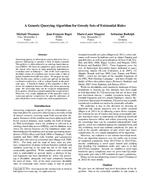Inproceedings4042: Unterschied zwischen den Versionen
Aus International Center for Computational Logic
Markus Krötzsch (Diskussion | Beiträge) K (Textersetzung - „}} {{Publikation Author |Rank=4 |Author=“ durch „; “) |
Michael Thomazo (Diskussion | Beiträge) Keine Bearbeitungszusammenfassung |
||
| Zeile 1: | Zeile 1: | ||
{{Publikation Erster Autor | {{Publikation Erster Autor | ||
|ErsterAutorVorname=Michaël | |||
|ErsterAutorNachname=Thomazo | |ErsterAutorNachname=Thomazo | ||
|FurtherAuthors=Jean-François Baget; Marie-Laure Mugnier; Sebastian Rudolph | |||
|FurtherAuthors=Jean-François Baget | |||
; Marie-Laure Mugnier | |||
; Sebastian Rudolph | |||
}} | }} | ||
{{Inproceedings | {{Inproceedings | ||
|Referiert=1 | |Referiert=1 | ||
|Title=A Generic Querying Algorithm for Greedy Sets of Existential Rules | |Title=A Generic Querying Algorithm for Greedy Sets of Existential Rules | ||
|To appear=0 | |||
|Year=2012 | |Year=2012 | ||
|Booktitle=Proceedings of the 13th International Conference on the Principles of Knowledge Representation and Reasoning (KR'12) | |||
|Booktitle=KR | |Publisher=AAAI | ||
|Publisher= | |||
}} | }} | ||
{{Publikation Details | {{Publikation Details | ||
|Abstract= | |Abstract=Answering queries in information systems that allow for ex- pressive inferencing is currently a field of intense research. This problem is often referred to as ontology-based data ac- cess (OBDA). We focus on conjunctive query entailment un- der logical rules known as tuple-generating dependencies, existential rules or Datalog+/-. One of the most expressive decidable classes of existential rules known today is that of greedy bounded treewidth sets (gbts). We propose an algo- rithm for this class, which is worst-case optimal for data and combined complexities, with or without bound on the pred- icate arity. A beneficial feature of this algorithm is that it allows for separation between offline and online processing steps: the knowledge base can be compiled independently from queries, which are evaluated against the compiled form. Moreover, very simple adaptations of the algorithm lead to worst-case-optimal complexities for specific subclasses of gbts which have lower complexities, such as guarded rules. | ||
| | |Download=Kr-12-bmrt.pdf | ||
| | |Forschungsgruppe=Computational Logic | ||
|DOI=http://www.aaai.org/ocs/index.php/KR/KR12/paper/view/4542 | |DOI=http://www.aaai.org/ocs/index.php/KR/KR12/paper/view/4542 | ||
}} | |||
| | {{Forschungsgebiet Auswahl | ||
|Forschungsgebiet=Existenzielle Regeln | |||
}} | }} | ||
Aktuelle Version vom 28. Oktober 2014, 12:09 Uhr
A Generic Querying Algorithm for Greedy Sets of Existential Rules
Michaël ThomazoMichaël Thomazo, Jean-François BagetJean-François Baget, Marie-Laure MugnierMarie-Laure Mugnier, Sebastian RudolphSebastian Rudolph
Michaël Thomazo, Jean-François Baget, Marie-Laure Mugnier, Sebastian Rudolph
A Generic Querying Algorithm for Greedy Sets of Existential Rules
Proceedings of the 13th International Conference on the Principles of Knowledge Representation and Reasoning (KR'12), 2012. AAAI
A Generic Querying Algorithm for Greedy Sets of Existential Rules
Proceedings of the 13th International Conference on the Principles of Knowledge Representation and Reasoning (KR'12), 2012. AAAI
- KurzfassungAbstract
Answering queries in information systems that allow for ex- pressive inferencing is currently a field of intense research. This problem is often referred to as ontology-based data ac- cess (OBDA). We focus on conjunctive query entailment un- der logical rules known as tuple-generating dependencies, existential rules or Datalog+/-. One of the most expressive decidable classes of existential rules known today is that of greedy bounded treewidth sets (gbts). We propose an algo- rithm for this class, which is worst-case optimal for data and combined complexities, with or without bound on the pred- icate arity. A beneficial feature of this algorithm is that it allows for separation between offline and online processing steps: the knowledge base can be compiled independently from queries, which are evaluated against the compiled form. Moreover, very simple adaptations of the algorithm lead to worst-case-optimal complexities for specific subclasses of gbts which have lower complexities, such as guarded rules. - Forschungsgruppe:Research Group: Computational LogicComputational Logic
@inproceedings{TBMR2012,
author = {Micha{\"{e}}l Thomazo and Jean-Fran{\c{c}}ois Baget and
Marie-Laure Mugnier and Sebastian Rudolph},
title = {A Generic Querying Algorithm for Greedy Sets of Existential Rules},
booktitle = {Proceedings of the 13th International Conference on the
Principles of Knowledge Representation and Reasoning (KR'12)},
publisher = {AAAI},
year = {2012}
}
